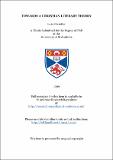Files in this item
Towards a Christian literary theory
Item metadata
| dc.contributor.advisor | Johnson, Ian | |
| dc.contributor.advisor | Boyd, Stephen | |
| dc.contributor.advisor | Ashe, Anthony | |
| dc.contributor.author | Ferretter, Luke | |
| dc.coverage.spatial | x, 368 p. | en_US |
| dc.date.accessioned | 2018-07-11T09:42:41Z | |
| dc.date.available | 2018-07-11T09:42:41Z | |
| dc.date.issued | 1999-01 | |
| dc.identifier.uri | https://hdl.handle.net/10023/15232 | |
| dc.description.abstract | Most contemporary literary theories are either explicitly or implicitly atheistic. This thesis describes a literary theory whose principles are derived from or consistent with Christian theology. It argues against modern objections to such a theory that this is a rationally and ethically legitimate mode of contemporary literary theory. The first half of the thesis constitutes an analysis of deconstruction, of Marxism and of psychoanalysis. These are three of the most influential discourses in modern literary theory, each of which constitutes a significant argument against the existence of God, as this has traditionally been understood in Christian theology. In a chapter devoted to each theory, I examine its relation to Christian theology, and argue that it does not constitute a conclusive argument against the truth-content of such theology. I go on to assess which of its principles can be used in modem Christian literary theory, and which cannot. The second half of the thesis constitutes an analysis of a Christian tradition of thought that pertains to literary theory. In the fourth chapter, I examine the concepts of language and of art expressed or implied in the Bible, St. Augustine and St. Thomas Aquinas, and assess which of these concepts could be used in Christian literary theory today. In the fifth chapter, I examine certain twentieth-century Christian philosophers and literary critics, and assess how their thought could be used in contemporary Christian literary theory. In the final chapter, I synthesize the conclusions to these arguments into the outline of a literary theory that both derives from Christian theology and takes account of the objections to such theology posed by contemporary literary theory. | en_US |
| dc.language.iso | en | en_US |
| dc.publisher | University of St Andrews | |
| dc.subject.lcc | PN49.F4 | |
| dc.subject.lcsh | Christianity and literature | en |
| dc.subject.lcsh | Literature--History and criticism--Theory, etc | en |
| dc.subject.lcsh | Theology | en |
| dc.title | Towards a Christian literary theory | en_US |
| dc.type | Thesis | en_US |
| dc.type.qualificationlevel | Doctoral | en_US |
| dc.type.qualificationname | PhD Doctor of Philosophy | en_US |
| dc.publisher.institution | The University of St Andrews | en_US |
This item appears in the following Collection(s)
Items in the St Andrews Research Repository are protected by copyright, with all rights reserved, unless otherwise indicated.

